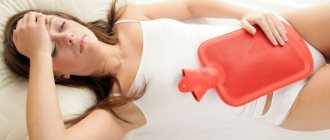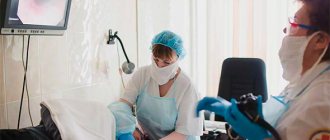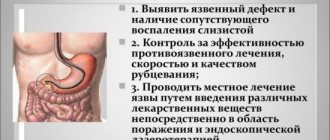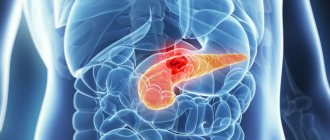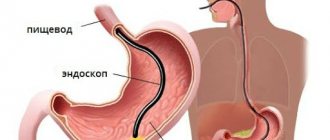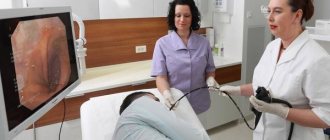JSC "Medicine" (clinic of academician Roitberg) operates a Pain Treatment Center. More details about the Pain Treatment Center
Gastroenterologist
Vinogradov
Dmitry Alekseevich
4 years of experience
Gastroenterologist
Make an appointment
Abdominal pain occurs in many situations. Most often this is a symptom of a less serious disorder, but in some cases it may indicate a more serious condition. Here it is important to consider the different parameters regarding pain.
Types of intestinal diseases
Intestinal diseases are divided into several types.
These include functional intestinal disorders (diarrhea or constipation), various intestinal infections, non-infectious inflammatory diseases, poisoning, intestinal malabsorption, duodenitis, hemorrhoids, anal fissures, parasitic diseases, tumors, etc. The treatment of many of these diseases requires long-term therapy, which is prescribed by a doctor and carried out under his supervision. When should you see a doctor?
There are signs of intestinal dysfunction in which you should consult a doctor:
- deterioration of psycho-emotional state: slow speech, irritability, rapid fatigue, drowsiness;
- body temperature more than 39°C;
- bloody stools;
- incessant vomiting;
- diarrhea for more than 2 days;
- frequent constipation;
- intense abdominal pain that is not relieved by intestinal medications.
Functional intestinal disorders are disorders of motility and movement of food masses to the colon. These include:
- Irritable bowel syndrome. This disorder is characterized by bloating and pain in the abdomen. It can also be manifested by frequent or infrequent bowel movements.
- Functional flatulence. It occurs due to the accumulation of gases in the intestines and is manifested by discomfort, bloating and rumbling in the abdomen.
- Functional constipation is the absence of bowel movements for 2 days or more.
- Functional diarrhea is defecation more than 3 times a day, which is often accompanied by loose stools.
Figure 1. Irritable bowel syndrome. Image: VectorMine/Depositphotos
Which specialist should I contact?
It all depends on the reason why your stomach hurts. Initially, you should contact a therapist who works at (academician Roitberg’s clinic). He will perform a diagnosis and then refer you to the right specialist. If the diagnosis is fibroids, then you will need to consult a gynecologist (), if a person has kidney stones, then you need a nephrologist (), if you have diagnosed a duodenal or gastric ulcer, then you need the help of a gastroenterologist (). In case of ovarian torsion or appendicitis, the patient is referred to a surgeon (), and with bruises and injuries the patient will be treated by a therapist ().
To contact JSC "Medicine" (metro Mayakovskaya, metro Belorusskaya, metro Tverskaya, metro Chekhovskaya), you should dial phone numbers or drive up in person. If you have abdominal pain on the left side and want to reach a therapist, who should always begin examining the patient, dial the phone number.
Causes of intestinal disorders
Functional bowel disorders occur for various reasons, related or unrelated to food intake. Poor health can result from:
- Binge eating. Because of it, undigested food accumulates in the intestinal lumen, in which the processes of fermentation and decay begin.
- Diet violation. Disorders are provoked by an abundance of fatty, smoked, fried and spicy foods.
- Incorrect use of antibiotics. Antibiotics can act not only on pathogenic bacteria, but also on healthy intestinal microflora, which leads to dysbiosis. To avoid dysbiosis, a course of antibacterial drugs must be combined with probiotics—medicines containing beneficial bacteria. It is recommended to take the probiotic 4 hours after the antibiotic.
- Stressful situations. Emotional stress often leads to intestinal dysfunction.
Lower abdominal pain in women: physiological causes
In this case, pain is associated with physiological changes occurring in the body. They can occur at different stages of the menstrual cycle, early pregnancy, and be observed during hormonal changes (including during menopause).
Soon after fertilization, a woman may feel a nagging pain. This is due to the introduction of the egg into the endometrium of the uterus, the integrity of which is disrupted. As the fetus grows, the internal organs shift, which sometimes provokes severe discomfort.
Many girls experience severe pain during ovulation in the lower abdomen, the causes of which are hidden in changes in hormonal levels resulting from the rupture of the follicle and the release of the egg. They are often accompanied by other symptoms:
Before menstruation, pain is also a frequent companion for many women. If the patient has been examined, no pathologies have been identified, and unpleasant sensations do not interfere with her normal lifestyle, then such manifestations fit within the boundaries of the norm. When the pain is intense and provokes a serious deterioration in the general condition, dysmenorrhea (algomenorrhea) is usually diagnosed.
Classification of drugs for the intestines
Drugs for the treatment of intestinal disorders can be classified according to the clinical manifestations for which they are appropriate to use.
In case of predominance of flatulence and abdominal pain, antispasmodics are used. This choice is due to the fact that pain is often based on spasm. Antispasmodics relax the intestinal muscles, which improves intestinal motility. Enzyme preparations are also used for abdominal pain and indigestion.
Figure 2. Antispasmodics relax the intestinal muscles. Picture: makyzz / freepik.com
If the leading clinical symptom is constipation, preference is given to laxatives. They are divided into 2 types:
- Irritating intestinal receptors. This group includes plant preparations containing anthraglycosides.
- Increasing the volume of intestinal contents (saline laxatives).
- Stool softeners (oils, glycerin).
For diarrhea, preference is given to enveloping, adsorbent and anti-inflammatory drugs. In some cases, probiotics or intestinal antiseptics may also be recommended. Diarrhea leads to large fluid loss or even dehydration, so it is necessary to take rehydrating medications that will restore water balance.
Diagnostics
Establishing the root cause of pain in the lower abdomen in women is difficult even for an experienced doctor, since it is necessary to differentiate diseases of the reproductive, digestive, and urinary systems. The patient is examined by an obstetrician-gynecologist and a gastroenterologist, and other specialists are involved if necessary. The diagnostic plan includes laboratory and instrumental methods:
- Examination on the chair.
In a classic two-manual examination, the doctor assesses the size and consistency of the uterus, and identifies tenderness or enlargement of its appendages. A vaginal examination using speculum is needed to examine the mucous membrane of the vagina, cervix, and determine prolapse of the internal reproductive organs in women. - Ultrasonography.
An ultrasound scan examines the condition of the uterus and appendages, detecting signs of pregnancy, space-occupying formations, and an inflammatory process. Abdominal sonography is necessary to exclude appendicitis and pathology of the distal intestine. An ultrasound of the bladder is performed after preliminary preparation. - Endoscopic methods.
Hysteroscopy is necessary to examine the uterine cavity, find benign and malignant neoplasms, and chronic inflammation. In case of possible Crohn's disease or UC, the gastroenterologist prescribes a colonoscopy, which, if indicated, is supplemented with a biopsy. - X-ray diagnostics.
Hysterosalpingography is a method for assessing the patency of the fallopian tubes and identifying sclerotic changes in women that are specific to chronic adnexitis. To confirm or exclude pathology of the urinary organs, excretory urography is used. Irrigoscopy is used to visualize the intestinal mucosa. - Laboratory methods.
If algomenorrhea is suspected, it is necessary to determine the levels of estrogen and progesterone; for early diagnosis of pregnancy, the content of human chorionic gonadotropin is measured. If there are signs of inflammation, smears are taken from the urethra and vagina, in which the causative agent of the infection is determined using a microbiological method.
For pain in the lower abdomen, a woman should consult a gynecologist
TOP drugs for the intestines
Consider a list of 15 drugs for the treatment of intestinal disorders. This is not a rating of medications, since different medications will be suitable for different patients depending on the disease and individual characteristics of the body.
No-shpa
The active ingredient of the drug is drotaverine. Drotaverine belongs to the group of antispasmodics - drugs that relax the intestinal muscles. Available in the form of tablets and solution for intramuscular administration. No-spa is used for abdominal pain of spasmodic origin and flatulence. Drotaverine is also included in the following medicines: doverine, droverine, spasmol, spasmonet, spazoverine.
Important!
If abdominal pain and flatulence do not go away within 1-2 hours after taking the maximum single dose of the drug, consult a doctor.
Contraindications and special instructions. Preparations with drotaverine are contraindicated in case of liver, kidney or heart failure, lactose intolerance, galactosemia. They should also not be used by children under 6 years of age. Pregnant and breastfeeding women should consult a doctor before using drotaverine.
Creon
This medicine contains pancreatin, an enzyme that contains substances that facilitate the digestion of proteins, fats and carbohydrates. The medicine is used for overeating, pain and heaviness in the abdomen, as well as for insufficiency of the pancreas' own enzymes. Creon is available in the form of enteric capsules and granules. Pancreatin is also the active ingredient of the following drugs: Mezim, Micrazim, Panzicam, Pakcreatin.
Contraindications and special instructions. Creon should not be used in the acute phase of chronic pancreatitis. Children and pregnant women can be treated with pancreatin only on the recommendation of a doctor.
Espumisan
The basis of this drug is simethicone. Simethicone reduces the surface tension of gas bubbles in the intestines. This property leads to their fusion and destruction, and the released gas is then removed naturally through peristalsis.
The medicine is recommended for use for flatulence and abdominal pain, after abdominal surgery with increased gas formation, and also as a preparation for diagnostic studies of the gastrointestinal tract.
The drug is available in the form of capsules and emulsions for oral administration. There are also preparations in the form of granules (espumisan extra) and drops (espumisan baby). Similar medications with simethicone: meteospasmil, bobotik, motilegaz, simeotik.
Contraindications and special instructions. After consultation with a doctor, the drug can be used during pregnancy and breastfeeding. Special children's dosage forms with simethicone can be used for infants.
Motilium
The active ingredient in Motilium is domperidone. This drug has an antiemetic effect due to its effect on the receptors of the nervous system. Domperidone is recommended for use in cases of nausea, vomiting, heartburn, hiccups, flatulence, pain in the upper abdomen, belching of air or gastric contents.
The drug is available in the form of a suspension, tablets for oral administration and lozenges (Motilium Express). Medicines similar to Motilium: Domet, Domperidone, Motilak, Motizhekt, Motinorm, Passazhix.
Contraindications and special instructions. The drug should not be used by children under 12 years of age, pregnant or breastfeeding women. It is also contraindicated in patients with intestinal obstruction and intestinal bleeding. Domperidone should not be taken simultaneously with certain antibiotics, antifungals, and antiarrhythmic drugs.
Glycerin (rectal suppositories)
This medicine contains glycerol, which has a laxative effect due to two properties: it softens stool and stimulates peristalsis due to its irritating effect on the rectal mucosa. The drug is best used for sudden constipation to facilitate bowel movements. The use of glycerin in courses is not recommended. Such suppositories can be used during pregnancy and breastfeeding. The drug can also be found in pharmacies under the name "glicelax".
Contraindications and special instructions. The use of suppositories with glycerin is contraindicated for hemorrhoids in the acute phase, anal fissures, inflammatory diseases and rectal tumors.
Glycerin suppositories are effective for constipation. Photo: jayzynism/Depositphotos
Lactulose
Lactulose is one of the most effective laxatives. It attracts water into the intestinal lumen, stimulates peristalsis, and restores the physiological rhythm of bowel movements. The drug can be used in children. The medicine is available in the form of syrup. This active substance (lactulose) is also included in the composition of medicines: Duphalac, Lactolex, Prelax.
Contraindications and special instructions. Lactulose can be used in children as prescribed by a doctor in a special dosage. The drug is contraindicated in case of galactose intolerance, lactase deficiency, rectal bleeding.
Important!
It is advisable to use lactulose only in courses - for chronic constipation after bowel movements using enemas or suppositories. In case of sudden constipation, lactulose will not help, but will lead to flatulence and abdominal pain.
Forlax
Forlax contains the active substance macrogol, which is part of the group of osmotic laxatives. Macrogol attracts liquid into the intestinal lumen, as a result of which the volume of feces increases and gastrointestinal motility is stimulated. The effect of the drug develops 24-48 hours after administration.
Forlax is recommended for use for symptomatic constipation and for preparation before diagnostic studies of the colon. The drug is available in the form of powders for the preparation of a solution for oral administration. There are powders with dosages for adults and for children over 8 years old. Macrogol can also be found in products called: d-forject, lavacol, microlax plus, forteza, fortrans.
Contraindications and special instructions. Forlax is contraindicated for abdominal pain of unknown cause, inflammatory bowel diseases (ulcerative colitis, Crohn's disease), intestinal obstruction. Also, the medicine should not be given to children under 8 years of age. The drug can be taken during pregnancy and lactation.
Loperamide
The basis of this medicine is the active substance of the same name. Loperamide is an antidiarrheal drug. The medicine acts on receptors in the intestinal mucosa, as a result of which its tone and motility decrease, and the time it takes for a bolus of food to pass through the gastrointestinal tract increases. The effect of the drug develops quickly and lasts 4-6 hours. Loperamide is used to treat acute and chronic diarrhea. In the pharmacy you can find dosage forms in the form of capsules or tablets. Similar drugs: diara, lopedium, imodium express.
Contraindications and special instructions. The drug is contraindicated for use in cases of constipation, bloating, and colitis. Children under 4 years of age and pregnant women in the 2nd trimester should not be treated with loperamide. In the Ⅱ and Ⅲ trimesters, the drug can be used with great caution and only after consultation with a doctor.
Activated carbon
The drug belongs to the group of enterosorbents and has an antidiarrheal effect, and also adsorbs excess fluid from the intestinal contents, metabolic products, poisons and toxins, and gases. Activated charcoal is completely eliminated from the intestines within 24 hours after ingestion.
The medicine is recommended for use in cases of diarrhea, flatulence, intoxication, food poisoning, drug poisoning and food allergies. The drug is available in tablet form. Activated carbon is also sold under the names: sorbex, carbopect, ultra-adsorb, extrasorb.
Contraindications and special instructions. Coal should not be used for ulcerative lesions of the stomach and intestines, bleeding from the gastrointestinal tract, or intestinal atony. Children can be treated with charcoal only after 5 years. Activated charcoal reduces the effectiveness of other medications when taken at the same time.
Figure 3. How activated carbon works. Source: International Journal of Engineering Research / ResearchGate
Smecta
The drug contains the active ingredient diosmectite. It is an adsorbent and antidiarrheal agent of natural origin. Diosmectite stabilizes the mucous barrier in the intestines and protects the digestive tract from intestinal microorganisms and toxins.
Smecta is recommended for use in acute and chronic diarrhea, heartburn, bloating, abdominal pain and dyspepsia. The drug is available in the form of powder, suspension and effervescent tablets. Diosmectite is also included in medicines: smectite, dioctab, neosmectin, endosorb.
Contraindications and special instructions. Smecta is contraindicated in patients with intestinal obstruction. The drug can be used by children, as well as pregnant and breastfeeding mothers. Diosmectite significantly reduces the effectiveness of other drugs when taken orally, so the interval between the use of it and another drug should be at least 1-2 hours.
Enterosgel
Enterosgel contains polymethylsiloxane polyhydrate, a substance with a porous structure and a strong enterosorbing and detoxifying effect. Enterosgel binds and removes toxic substances of various nature from the body, including bacteria, food allergens, and alcohol. At the same time, the drug does not reduce the absorption of vitamins and microelements needed by the body, helps restore disturbed intestinal microflora and does not affect its peristalsis. The medicine is eliminated from the gastrointestinal tract within 12 hours after administration.
Enterosgel is recommended for use in cases of acute and chronic intoxication, acute intestinal infection, food and drug allergies. The drug is available in the form of a gel or paste, making it convenient to use for treating young children. Similar drugs: enteroactin, enterodesgel.
Contraindications and special instructions. The drug can be used in children, pregnant and lactating women. Enterosgel reduces the effectiveness of other medications, so it is necessary to maintain an interval of 1-2 hours between their use.
In case of poisoning and intestinal infections, drugs that remove toxins from the body help. Photo: NewAfrica/Depositphotos
Linex
The product belongs to probiotics - drugs that normalize intestinal microflora. Linex contains lactic acid bacteria, bifidobacteria and enterococci, which normally live in the large intestine. These microorganisms create an acidic environment, which stops the proliferation of pathogens and promotes good digestion. They also have a positive effect on the synthesis of vitamin K and ascorbic acid, and increase the body’s immune resistance.
Linex is available in the form of capsules for adults, as well as powder and drops (Linex for children). The medicine is recommended for use for the prevention and treatment of dysbiosis, as well as while taking antibiotics.
Contraindications and special instructions. Linex should not be taken by people with allergies to dairy products. It can be used during pregnancy and breastfeeding. The medicine should not be taken with hot drinks, nor should you drink alcohol soon after taking the probiotic. In addition to Linex, there are other probiotics that may contain different combinations of beneficial bacteria: enterosan, bactistatin, bifidumbacterin, bificol, probifor.
Live yeast probiotics. Photo: Rainis Venta / Wikipedia (CC BY-SA 3.0)
Enterol
Enterol is an antidiarrheal agent that is a live, non-pathogenic yeast specially grown in the laboratory. The drug has an antimicrobial and antitoxic effect, improves the enzymatic function of the intestines. Enterol is recommended for use in cases of intestinal dysbiosis, acute diarrhea, pain and bloating in the abdomen, enterocolitis. The drug is available in the form of capsules and powder for the preparation of suspension.
Contraindications and special instructions. Enterol is approved for use in children over one year of age. The drug is contraindicated in case of yeast allergy and lactose intolerance.
Stopdiar
The active ingredient of Stopdiar is the antimicrobial agent nifuroxazide. It destroys the microbial cell membrane and blocks the activity of pathogenic bacteria. Nifuroxazide is practically not absorbed into the blood, which makes it highly effective in the treatment of intestinal disorders. The drug does not interfere with the vital functions of beneficial substances and restores healthy intestinal microflora during bacterial diarrhea.
The use of nifuroxazide is recommended for acute diarrhea if it occurs without fever and intoxication. The drug is available in the form of capsules, tablets and suspension for oral administration. Nifuroxazide can also be found in pharmacies under the names: adisord, nifural, diafuril, deenterol, counterdiar, mirofuril, roxifuril, ecofuril.
Contraindications and special instructions. Drugs containing nifuroxazide are strictly contraindicated during pregnancy. When using the medicine, it is recommended to simultaneously carry out rehydration - eliminating dehydration of the body. It must be remembered that during treatment you need to stop drinking alcohol.
Nifuroxazide is an antibacterial agent. This means that the same rules that must be taken into account when taking other antibiotics apply to it. The medicine should not be taken uncontrolled; you must follow the instructions. The drug is recommended for use in courses that cannot be interrupted so that the sensitivity of bacteria to it does not disappear.
Important!
Nifuroxazide can be used to treat children, but with great caution and under medical supervision. The drug destroys the membrane of bacteria, which leads to their massive death and the release of large amounts of toxins. Some diarrhea pathogens contain a toxin that is dangerous to children, which can destroy blood cells and lead to serious acute kidney damage.
Trihydrosalt
Trihydrosol is used to eliminate and prevent dehydration. Dehydration develops with almost all types of diarrhea due to the release of large amounts of fluid from the body. This problem is especially relevant in children. The younger the child, the faster and more severe dehydration develops.
Trihydrosalt is a powder for preparing a solution, which contains different types of salts and dextrose. The drug restores the balance of fluids and microelements in the body.
Contraindications and special instructions. Trihydrosalt is contraindicated in patients with extremely severe dehydration, when fluid balance can only be restored through intravenous administration of drugs. The product should not be used for intestinal obstruction and severe vomiting. The drug is approved for the treatment of children, as well as pregnant and lactating women.
Cystitis
Cystitis is a pathology in which the inflammatory process affects the walls of the bladder. The disease is several times more common in women than in men. This is due to the structural features of the female genitourinary system, including a short and wide urethra, which greatly facilitates the penetration of infections into the urinary tract.
The pathology is characterized by frequent urination, with the urge to empty the bladder appearing every 15-30 minutes. Urine has a cloudy dark color, it often contains a small amount of mucus or pus, and there may be blood inclusions.
With cystitis, the patient feels cutting pain in the pelvic area above the pubis, which sharply intensifies when trying to urinate. Warmth helps relieve pain: taking a hot shower or applying a heating pad to your stomach.
Hyperthermia signals the presence of an inflammatory process. Patients have low-grade fever. In severe cases, the infection also affects other organs of the excretory system, leading to the development of urethritis or pyelonephritis. In this case, the patient’s temperature may rise to 39-39.5°C, and the woman’s general condition sharply worsens: severe weakness, cephalalgia, nausea, lower back pain, etc. occur.
Attention!
Pyelonephritis is an inflammatory process in the tubular system of the kidneys. This condition can lead to the development of a number of complications, so it requires urgent medical intervention.
Patients with cystitis are constantly bothered by the feeling of an incompletely emptied bladder, pressure in the pelvic area, cramps and spasms. Without treatment, a woman may develop urinary incontinence.
Diagnostic measures for this pathology include clinical analysis of urine and ultrasound examination of the bladder. To accurately determine the type of infectious agent, it is also necessary to perform a bacterial culture of urine. After making a diagnosis, the specialist prescribes antibacterial drugs to the patient aimed at destroying the pathogen. Fosfomycin, Nitrofurantoin and Cephalexin are most often used in the treatment of cystitis.
. You can also use antispasmodics and folk remedies to relieve symptoms: fruit drinks, decoctions of cranberry and lingonberry leaves, etc.
Paxil
A new generation antidepressant, a selective serotonin reuptake inhibitor. Paxil is prescribed for any depression in adults, anxiety disorders, and OCD. In children and adolescents aged 7-17 years, the drug is also used to treat mental disorders. You can buy Paxil only with a prescription and as prescribed by a doctor. As part of complex therapy, Paxil is also used to treat irritable bowel syndrome.
Paxil
GlaxoSmithKline, France
Depression of all types, including reactive and severe depression, as well as depression accompanied by anxiety.
In the treatment of depressive disorders, paroxetine is approximately as effective as tricyclic antidepressants. There is evidence that paroxetine may provide good results in patients in whom standard antidepressant therapy has failed. Taking paroxetine in the morning does not adversely affect the quality or duration of sleep. In addition, sleep may improve as paroxetine treatment works. When using short-acting hypnotics in combination with antidepressants, no additional side effects occurred. In the first few weeks of therapy, paroxetine is effective in reducing symptoms of depression and suicidal ideation. Results from studies in which patients took paroxetine for up to 1 year showed that the drug was effective in preventing relapses of depression. Obsessive-compulsive disorder from 340
523
- Like
- Write a review
Melipramine
Tricyclic antidepressant prescribed for IBS. "Melipramine" is indicated for psychoneurosis, psychogenic and endogenous depression, panic attacks, and enuresis in children. Contraindications include: severe renal or hepatic failure, manic syndrome, recent myocardial infarction, urinary retention. This is a prescription drug that is prescribed exclusively by a doctor.
Melipramine
EGIS Pharmaceuticals, PLC, Hungary
All forms of depression (with and without anxiety): major depression, depressive phase of bipolar disorder, atypical depression, depressive states;
- panic disorders; - bedwetting in children (over the age of 6 years; for short-term adjuvant therapy if an organic cause can be excluded). from 325
609
- Like
- Write a review
Imodium
The active substance of Imodium is loperamide. It is a symptomatic antidiarrheal drug that is often prescribed for IBS. The remedy is indicated for acute and chronic diarrhea due to allergies, stress, changes in diet, taking medications, and problems with metabolism. Imodium has a positive effect on intestinal motility (smooth muscle function). The drug is recommended for adults and children over 12 years of age.
Imodium
Janssen-Cilag, UK
Imodium is prescribed to adults and children over 5 years of age for stool disorders, in particular: the drug is used for symptomatic treatment of acute and chronic diarrhea of various origins (except for diarrhea caused by taking antimicrobial drugs);
Imodium is prescribed to patients with ileostomy to reduce the frequency and normalize the consistency of stools. from 340
5.0 1 review
1040
- Like
- Write a review
